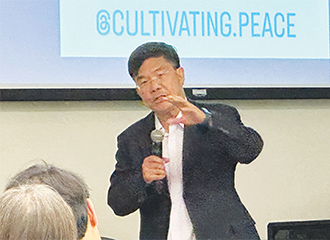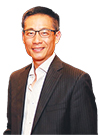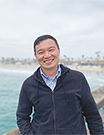Professor P. C. Luo: Tackling Controversial Ethics with Honesty


Professor P.C. Luo (羅秉祥教授) is known for his candid approach to discussions. Having spent years immersed in American culture and specializing in ethics, he often addresses highly controversial topics—never shying away from major social concerns. In this interview, readers will gain a rare glimpse into his sharp analytical mind and thought-provoking perspectives, making it an insightful read.
Reflecting on his academic journey, he recalled, "While writing my doctoral dissertation, I began considering the connection between philosophical background and theological studies. Among the various branches of theology, religious philosophy and ethics are the most closely related to philosophy. Moreover, ethical values are highly regarded in Chinese society, yet most Chinese clergy specialize in biblical studies or systematic theology, with few focusing on ethics. Because of this, I was determined to make ethics my long-term research focus, hoping to return to Hong Kong or Asia to serve Chinese churches after completing my studies."
After living in the United States for 11 years, Professor Luo returned to Hong Kong, where he served as a professor of religion and philosophy, department chair, and associate dean of the Faculty of Arts at Hong Kong Baptist University for 31 years.
Soon after, various churches invited him to teach on ethics, and he also began publishing articles in Christian journals to help believers reflect on faith and ethical issues. Later, he compiled these writings along with select sermons into a book—Clear Distinctions between Black and White(黑 白分明) (published in 1992). The book has continued to be reprinted over the years, marking the beginning of his ministry in written form.
Professor Luo soon immersed himself in public discussions, boldly addressing evolving social issues through his writing. He contributed to the Hong Kong Economic Journal, co-authoring the Philosophical Reflections on the Stars( 繁星哲語) column with other writers. He explained, "Since many readers of this column are non-believers, I cannot directly cite the Bible or theological arguments. Instead, I remind myself to write with both hands—one hand for brothers and sisters in the church, and the other for the broader public."
During this time, Professor Luo published two books for general audiences—Ethics Among the Stars and Life(繁星與道德), Death, and Gender (生死男女)—reflecting his ongoing effort to communicate moral reasoning to non-believers. Later, at the invitation of Rev. Arnold Yeung, he contributed to the development of a 21st-century ethics curriculum, eventually compiling the material into Common Sense Ethics (公理婆理話倫理), which explores ten core Christian ethical topics covering personal, family, social, and political dimensions. The book was well received by readers.


"Chinese society has always placed great emphasis on ethics and morality, but for Chinese immigrants in North America, the cultural and ethical gap is vast. They often find themselves at odds with mainstream values, leading to deep struggles," Professor Luo analyzed. "This not only reflects the realities of migration but also highlights the cultural tensions within bilingual or multilingual policies. Similarly, in matters of faith, we face two cultural spheres—the church and broader society. The values and ethical perspectives of believers and non-believers are vastly different, yet they coexist in the same society and cannot be completely separated."
Professor Luo emphasized that Christians’ "mother tongue" is faith, rooted in biblical and theological understanding—yet society may not recognize this language. Therefore, believers must learn to express their underlying beliefs in a different way—by understanding the sources of others’ thoughts and values and engaging the world in a different "language." He emphasized that this concept extends beyond linguistic second-language learning and is, in essence, an "acquired language"—a process of deep internalization and translation of cultural and ideological understanding.
In a multicultural society, different groups inevitably encounter public issues and value conflicts. The only way to coexist peacefully is through coordination and mutual understanding, which requires a shared commitment to certain principles.
He also emphasized, "The law provides only the minimum moral baseline—it does not teach us what we 'ought to do' but merely defines the boundary of what is 'forbidden' (illegal). Therefore, we must not mistake the law for the ultimate moral standard in life. It merely allows individuals to self-regulate within society and maintain basic order, but it does not guide people in living a fulfilling and virtuous life."

A family of four
He believes that as parents and members of faith communities, the goal should be to guide the next generation toward a life that surpasses legal obligations and embraces a deeper moral vision. Rather than settling for the mindset that "if it's legal, it's acceptable," young people should be encouraged to pursue integrity and righteousness in their choices.
In Western societies that emphasize personal freedom, many behaviors—such as prostitution, adultery, neglecting to help others, ignoring those in danger, or laziness—are not legally prohibited. However, legality does not equate to morality. If actions are determined solely by legality, society risks descending into moral chaos. Conversely, excessive legal restrictions can lead to an oppressive, overly regulated society.
Thus, striking a balance between law and morality is essential. Christians must respect legal systems while remaining steadfast in their faith-based ethical principles, setting an example of higher moral standards for society.
A growing number of second-generation believers raised in the church are choosing to leave, partly due to a disconnect in cultural communication with older generations. Many perceive the church as "rigid and outdated," resistant to change, and fixated on criticism rather than encouragement. This creates an environment that feels stifling rather than uplifting.
Professor Luo emphasizes that guiding the next generation should not be limited to pointing out what is "wrong." Instead, leaders and parents must actively inspire young people to recognize what is "right" and offer a compelling vision of a fulfilling life. Parents should foster genuine, meaningful conversations with their children and lead by example—demonstrating a life that reflects the values they wish to impart.
Professor Luo will soon visit Toronto to lead multiple gatherings, tackling sensitive yet urgent topics—issues that spark curiosity but often lack clear answers. He invites the community to join in these discussions, offering a rare opportunity for reflection, engagement, and collective wisdom. Helena Lee
Helena Lee





